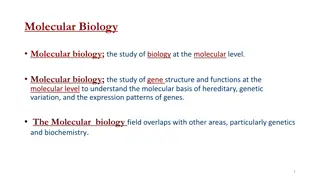Biology Assignment
Tropical rainforests are incredibly diverse ecosystems home to a wide variety of plant and animal species. Jaguars, one of the largest big cats, are facing endangerment primarily due to habitat loss. Learn about their adaptations, population decline, and the threats they face in this delicate ecosystem.
Download Presentation

Please find below an Image/Link to download the presentation.
The content on the website is provided AS IS for your information and personal use only. It may not be sold, licensed, or shared on other websites without obtaining consent from the author.If you encounter any issues during the download, it is possible that the publisher has removed the file from their server.
You are allowed to download the files provided on this website for personal or commercial use, subject to the condition that they are used lawfully. All files are the property of their respective owners.
The content on the website is provided AS IS for your information and personal use only. It may not be sold, licensed, or shared on other websites without obtaining consent from the author.
E N D
Presentation Transcript
Biology Assignment By Luna Ababneh , Maria Janho and Saba Siam
Tropical Rainforest There are many endangered animals in the tropical rainforest. One of the endangered animals is the jaguar.
Information about Tropical rainforest Tropical rainforests are the most biologically diverse terrestrial ecosystems in the world. The Amazon rainforest is the world s largest tropical rainforest. It is home to around 40,000 plant species , nearly 1,300 bird species , 3,000 types of fish, 427 species of mammals , and 2.5 million different insects . There is a lot of rain , a lot of sunlight and high biodiversity . Tropical rainforests cover less than 3% of the planet , yet they are home to more than half our planet s terrestrial animal species.
The adaptations that the jaguars have to live in the tropical rainforest Jaguars have adapted to the wet environment of the tropical rainforest . They are excellent swimmers , and unlike other cats, they seek out water for bathing and swimming. The jaguars fur keeps it camouflaged in the tropical rainforest.
Information about jaguars The word jaguar comes from the indigenous word yaguar which means (He who kills with one leap.) There are around 173,000 jaguars left in the whole world today , and most of these big cats are found in the Amazon rainforest and the Pantanal , the largest tropical wetland. Their stronghold is in Brazil it may hold around half of the estimated wild numbers. The jaguar is the third biggest cat in the world-after the tiger and the lion-and is the largest cat in the Americas. They can grow up to 170cm long , not including their impressive tails which can be up to 80 cm . They are good swimmers. Jaguars are larger and stronger than cheetahs. Jaguars can hit a blazing speed of 50mph , but cheetahs are an absolute blur, running at 70mph or more to take down their prey.
Population of jaguars The population began at approximately 300,000 jaguars and has now decreased to an estimated 15,000.
Reason of extinction Sadly , they have lost half of their historic range mainly due to habitat loss. Today , this majestic animal is mostly restricted to the tropical rainforests of the Amazon and in the nearby Pantanal wetlands.
What is being done now to preserve? Controlling access to and the use of natural resources. Monitoring jaguar populations and prey populations across the spectrum of land. Developing local capacity to manage and protect natural areas
We hope you like it This Photo by Unknown Author is licensed under CC BY This Photo by Unknown Author is licensed under CC BY-NC























